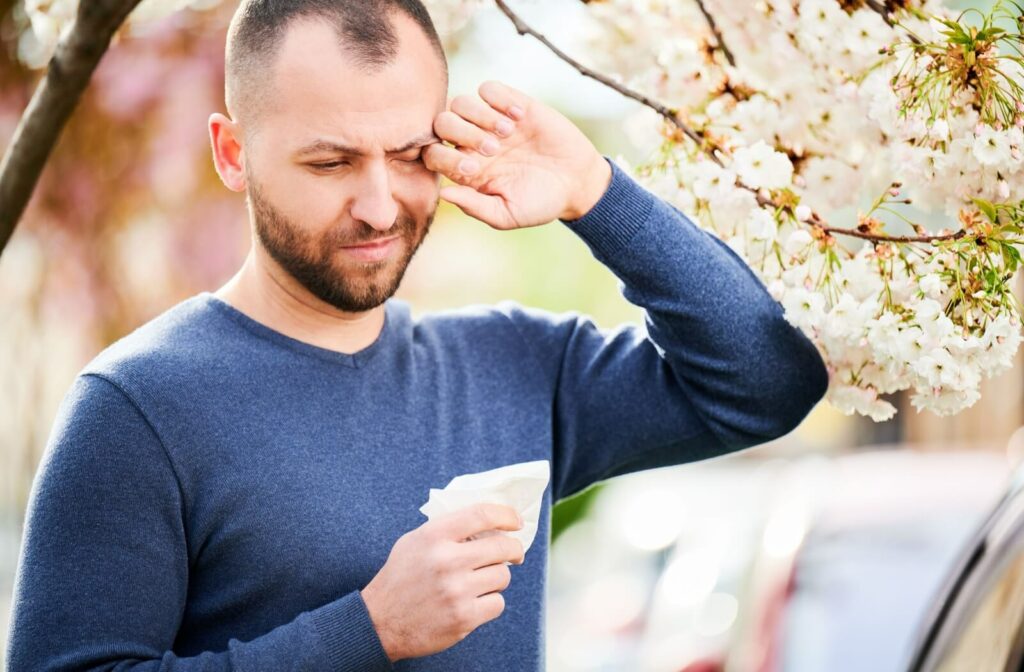If your eyes feel dry, itchy, or watery during allergy season, you’re not alone and you’re not imagining things. Allergies can absolutely play a role in dry eye symptoms, and the relationship between the 2 conditions is more connected than many people realize.
At Precision Eye Care, we often see patients who are dealing with both allergies and dry eyes, especially during the spring and fall. If you’re struggling with irritated eyes that just won’t settle down, understanding how allergies can affect your tear film, and what you can do about it, is a great first step toward finding relief.
What Is Dry Eye?
Dry eye is a common condition that occurs when your eyes don’t produce enough tears or when the tears you do produce aren’t functioning properly. A healthy tear film is essential for clear, comfortable vision. It keeps the surface of your eyes smooth, nourished, and protected from the environment.
Your tear film has 3 important layers:
- The oily layer, which prevents tears from evaporating too quickly
- The watery layer, which hydrates the eye and washes away debris
- The mucus layer, which helps tears stick evenly to the surface of the eye
When this delicate balance is disrupted, you may experience symptoms such as:
- A stinging or burning sensation
- Blurred vision
- A gritty or scratchy feeling
- Sensitivity to light
- Redness
- Excessive tearing (a counterintuitive but common symptom of dryness)
- Discomfort while wearing contact lenses
While dry eye can happen for many reasons, including age, medications, screen use, or certain health conditions, seasonal or environmental allergies are also a frequent and overlooked trigger.
How Allergies Trigger Dry Eye
Allergies happen when your immune system reacts to substances that are normally harmless, such as pollen, pet dander, or dust mites. These allergens can cause your body to release histamines, which in turn lead to symptoms like sneezing, congestion, and itchy eyes.
When it comes to your eyes, this histamine response can cause inflammation on the surface of the eye and around the eyelids. That inflammation can interfere with the glands responsible for producing tears particularly the oil-producing meibomian glands in your eyelids. As a result, your tear film may become unstable or evaporate too quickly, leading to dry, irritated eyes.
To make matters more confusing, your body may try to “fix” the issue by flooding the eyes with reflex tears which are mostly water and lack the proper balance of oils and mucus. This leads to watery eyes that still feel dry and uncomfortable.
So, while allergies and dry eye are 2 different conditions, they can share many overlapping symptoms:
- Irritated or burning eyes
- Redness
- Tearing or discharge
- Swelling of the eyelids or conjunctiva
- Light sensitivity
- The feeling that something is stuck in your eye
Because of this overlap, it’s important to see your optometrist for a proper diagnosis, especially if over-the-counter remedies haven’t helped.
Can Allergy Medications Make Dry Eye Worse?
Unfortunately, some medications used to treat allergies, especially oral antihistamines, can contribute to dry eye. These medications work by drying out the mucus membranes to stop sneezing and runny noses, but they can also reduce tear production in the eyes.
If you notice your eyes feeling drier after starting allergy medication, you’re not alone. Thankfully, there are alternatives. Your optometrist can recommend:
- Preservative-free artificial tears to restore moisture
- Lubricating eye drops that are safe to use alongside allergy medications
- Non-drying antihistamine eye drops
- Lifestyle adjustments to reduce exposure to allergens and relieve symptoms naturally

Managing Allergy-Related Dry Eye
If you suspect your allergies are triggering dry eye symptoms, the first step is identifying your specific allergens. Are your symptoms seasonal, like in spring or fall? Or do they happen year-round, possibly due to pets or indoor dust? Once you know your triggers, you can take simple steps to reduce exposure:
- Keep windows closed during high pollen times
- Use air purifiers with HEPA filters in your home
- Shower and change clothes after spending time outdoors
- Wash bedding frequently in hot water
- Avoid rubbing your eyes, even if they itch
- Wear sunglasses outdoors to shield your eyes from allergens
In addition to environmental strategies, certain lifestyle habits can help reduce dry eye symptoms:
- Follow the 20-20-20 rule during screen time: every 20 minutes, look at something 20 feet away for 20 seconds
- Eat a diet rich in omega-3 fatty acids to support tear production
- Use a humidifier indoors to keep air from becoming too dry, especially during winter or allergy season
- Stay hydrated by drinking enough water throughout the day
When to See an Eye Doctor
While occasional irritation during allergy season is normal, persistent or worsening symptoms shouldn’t be ignored. If your eyes are constantly dry, itchy, or blurry, it’s time to get a professional opinion.
At Precision Eye Care, we use detailed diagnostic tools to assess the health of your tear film, identify inflammation or gland dysfunction, and rule out other causes of eye irritation. From there, we can recommend a personalized treatment plan that may include prescription eye drops, in-office treatments, or adjustments to your allergy care routine.
We believe that eye comfort is more than just a luxury, it’s essential to your daily quality of life. Whether you’re dealing with seasonal allergies or ongoing dryness, our team is here to help you see clearly and feel better.
Clearer, More Comfortable Eyes Start Here
Living with dry eyes caused by allergies can be frustrating, but with the right support, relief is within reach. By understanding the link between your allergies and your tear film, you can take steps to protect your vision and improve your day-to-day comfort.
If dry eyes are interfering with your life, don’t wait. Book an appointment with Precision Eye Care today. We’re here to help you find long-lasting solutions for dry, irritated eyes in every season.



